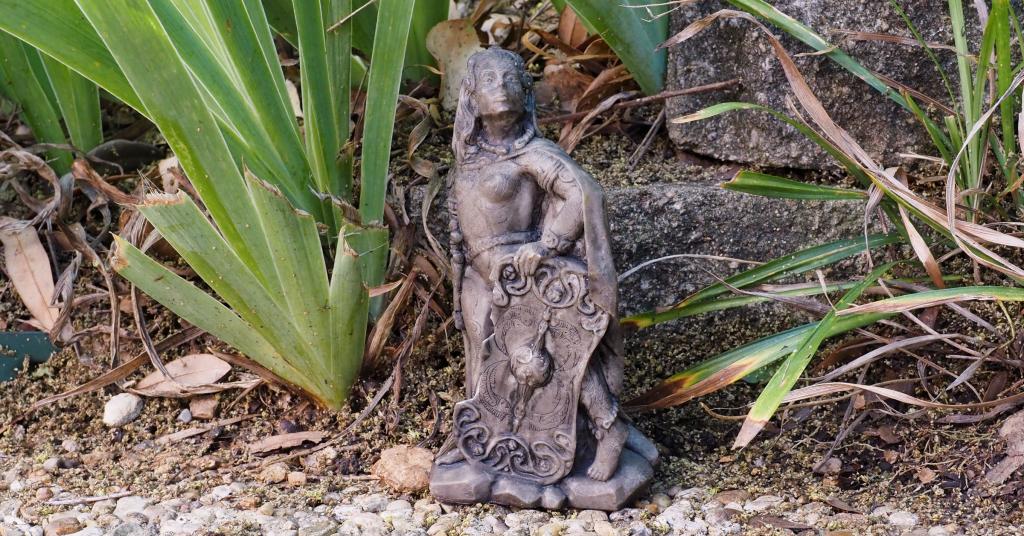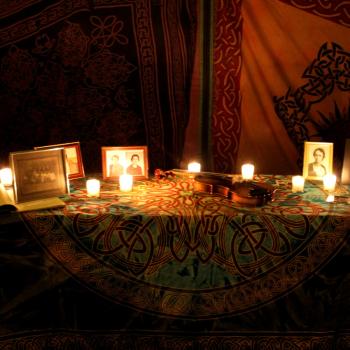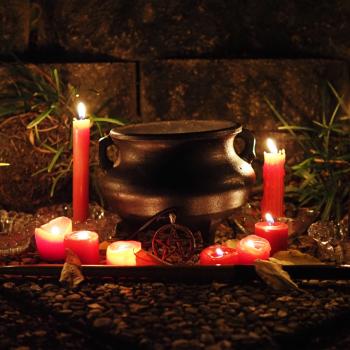Stephie Michaels asked a very good question:
I swore long ago to never again be controlled: not by parent, sibling, lover, church, priest, or even God. Yet I’m often told that I need to commit, swear to, and submit to various folks’ Gods of choice.
Am I terrible for not being willing to become someone’s slave, scared of stepping out of line? Is there room for being friends with the Gods, sometimes gifting them as you would a human friend, even sometimes working with Them?
Let me start by saying I’m disturbed that anyone would tell someone else that they must commit to any deity in any sense of the term. Different Gods call different people to worship and work with Them in different ways.
What the Morrigan asks of me is not necessarily what She asks of anyone else. The degree to which She asks someone to do something vs. demanding that they do it varies from person to person and from time to time. Further, the Morrigan’s approach is different from Cernunnos’ approach, which is different from Brighid’s approach, which is different from the approach of every other deity I’ve ever encountered.
The only thing any of us have reason to tell others they must do is to be respectful. Even there, what is respectful for Loki will likely be very different from what is respectful for Odin.
I suspect that many of these comments are less about “you must do things my way” and more about a lack of understanding of the many different ways there are to relate to and interact with the many Gods.
Or at least, I hope so.
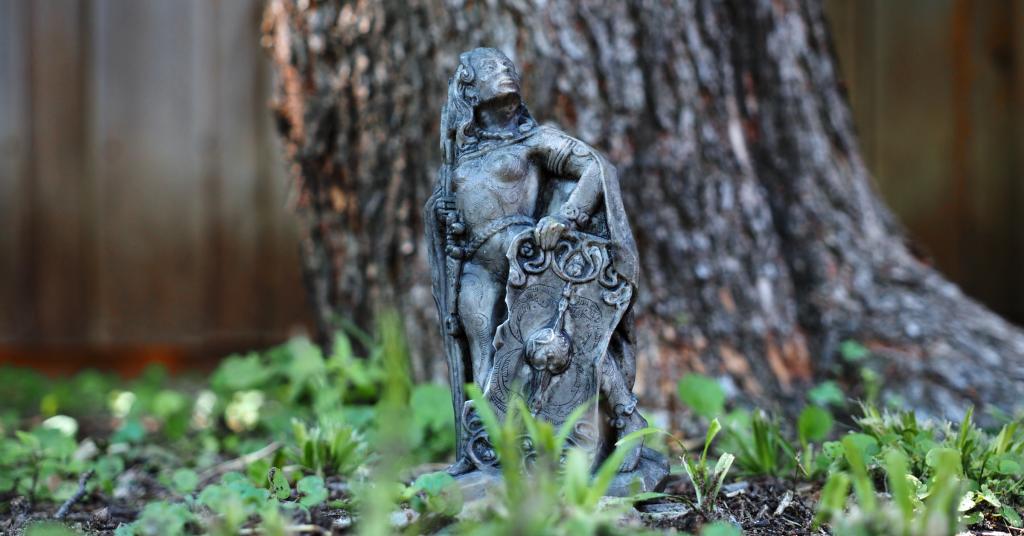
Begin at the beginning
Gods are the mightiest of spirits. I think I got that from Ian Corrigan of ADF, though I can’t be sure. The point is that there are many spirits – many spiritual persons: elemental spirits, land spirits, Nature spirits, ancestral spirits, human spirits, and others. All these spirits exist on a spectrum – exactly where one category ends and another begins is impossible to say.
What we can say is that whatever these spirits are, Gods are the most. They exist at the far end of the spectrum.
But while they are the most, they are still spirits. They are not “wholly other” as some Christians claim for their God – they are persons who we can relate to as persons.
We ground our relationships with the Gods in virtues, especially the virtues of hospitality and reciprocity. That is, we strive to be good hosts when we invite Them into our rituals and into our lives, and to be good guests when we enter Their presence. As They give to us, we give to Them, so that They may give to us again.
This forms the foundation for our relationships with the Gods.
Worship, work with, work for
Many Pagans have an aversion to the word “worship” – usually because of bad experiences in other religions. But to worship something (or more properly, to worship someone) is simply to declare that they are worthy. The Gods are worth of our worship. Not “because They’re Gods and we aren’t” (that’s too close to Calvinism for me) but because They are the personification of virtues and because They bring good things into our lives.
Some prefer to say they “work with” the Gods. We do that when we do Their work in this world – when we play on Their teams even though we’re minor role players and They’re the head coach and general manager.
And some of us say we “work for” this or that deity. Follow the Morrigan for very long and you’ll end up working for Her. I’ve lost track of how many times I’ve heard Her say “you, Druid – go do this.” And so I go do this.
I do this not out of any sense of subservience, but out of a sense of agreement and belonging. I believe in the Morrigan. Not in the sense of “I think She’s real” (even though obviously I do) but in the sense that I feel a strong affinity for Her virtues and Her values – I want to see those virtues and values spread further in our wider society. And so I gladly follow Her instructions.
If I don’t understand them, I follow them anyway – She has the perspective of a God. She knows things I do not, and She understands things I cannot, because I’m a human with imperfect understanding.
If She asked me to do something unethical or dishonorable I would of course refuse. I do not mindlessly follow anyone, and I am ultimately responsible for my own life. But the Morrigan has never made such a request, nor do I expect She ever will – Gods are always virtuous.
Oaths
Oaths are not to be made lightly. They are meant to be kept, period. As I often warn people, do not promise what you cannot or will not do. You will be held to your word.
You do not need to swear an oath to worship a God, or to work for or with Them. That should come after considerable time and experience – if at all.
But where they are made, oaths help build a foundation of confidence and stability. They build community and intimacy. We know what to expect from the Gods, and we know what They expect from us.
Don’t swear an oath because you think you have to do it to be a “real polytheist.” Don’t do it if you’re in an ecstatic afterglow. And don’t do it if you haven’t negotiated the terms.
But when a God (not another human) has asked you for an oath, where you want to strengthen the divine relationship, or especially if you can’t imagine doing anything else, then do it and do it well. Earlier this year I wrote A Ritual of Oathtaking for those who are considering such an action.
Divine slavery?
I know some people who call themselves “God-slaves” or something to that effect. While a couple of them were making themselves out to be something special to boost their egos, most were quite humble and even secretive about it (not that I’ve encountered a lot of them). Their relationship with their God had moved to the point where their trust and commitment was absolute.
I don’t think I could do that – I’m not that trusting of anyone. But I’ve never been asked to do it, and I don’t expect that I will. I serve the Gods I’m committed to in our current arrangements, to Their satisfaction (or at least, not to the point where They’ve seen the need to say something about it).
The point is that this is not typical of anyone, human or divine. It’s a very rare situation, and fear of it shouldn’t keep you from pursuing a divine relationship and taking it to great depths.
And of course, anyone who says you must become a God-slave doesn’t know what they’re talking about and should be ignored.
Some people are claimed
The vast majority of people who worship, work with, and/or work for a God do so freely and of their own will. The vast majority of oaths are freely given – some of them too freely.
Most.
But not all.
Some people are claimed. They don’t have a choice. The naïve folks who say “you always have a choice” should remember that you have a choice to not pay taxes – that rarely works out well.
All I can say is that if you’re worried about this happening, don’t. It’s rare, and approaching a God seems to have no impact on whether or not it happens.
Perfection is not expected
Are the Gods perfect? Different polytheists have different ideas about this. What we can say with certainty is that no humans are perfect. And the Gods – whose knowledge is greater than ours – know and understand this.
No Pagan or polytheist should be “scared of stepping out of line.” Our Gods are not the vengeful, jealous God of some forms of Christianity, just waiting to smite us for the slightest sin.
We should do our best, because our Gods deserve our best. We should go to great lengths to keep our commitments, because we are people of integrity who keep our word. We should show our Gods utmost respect, because They are worth of that respect.
When we fail – and we will, because we’re human – we should own our mistakes. Admit it, make it right, and do our best to do better next time.
In my experience, most of the Gods are very lenient and forgiving with newcomers. They’re looking for a long-term commitment, and that works best when They don’t scare off beginners.
As things progress, the expectations get higher. Mistakes and slights They laugh off with a beginner will be taken more seriously with an intermediate or advanced practitioner. If you know better, you’re expected to do better. But even then, They know we’re not perfect and They don’t expect perfection.
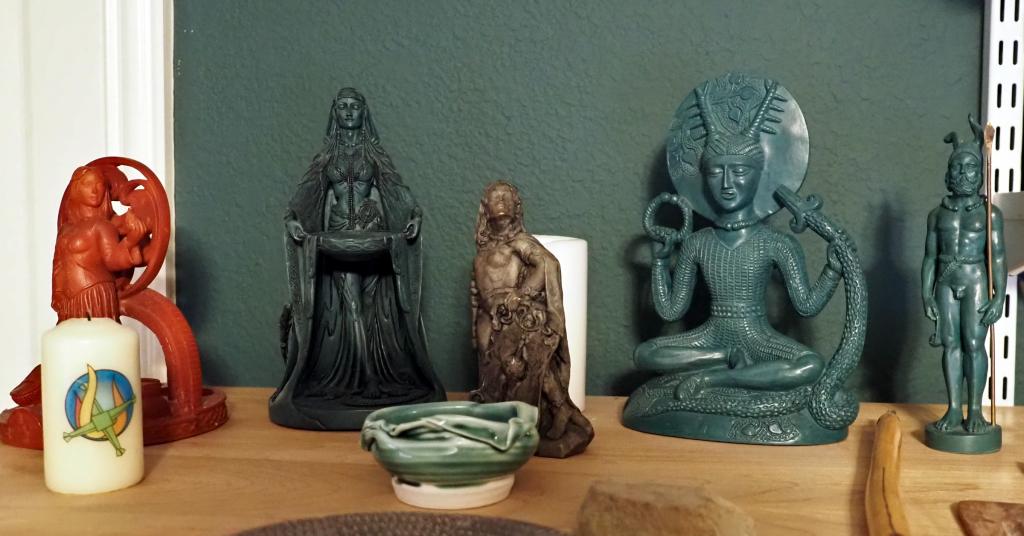
Begin a relationship where you are
Our Gods are not insecure – They have no need to control us. Most of Them are happy to meet us where we are. From there we begin a journey in virtues and values, a journey of service to something greater than ourselves.
Such a journey is best taken with willing and eager travelers, not with slaves.
There are many ways to serve many Gods. Find the one that is right for you, and for the God who calls to you.


